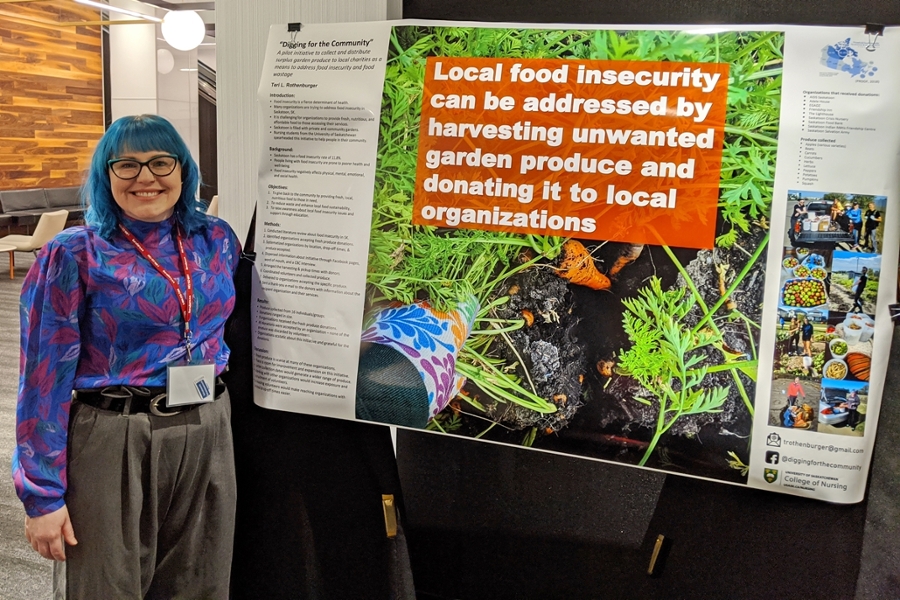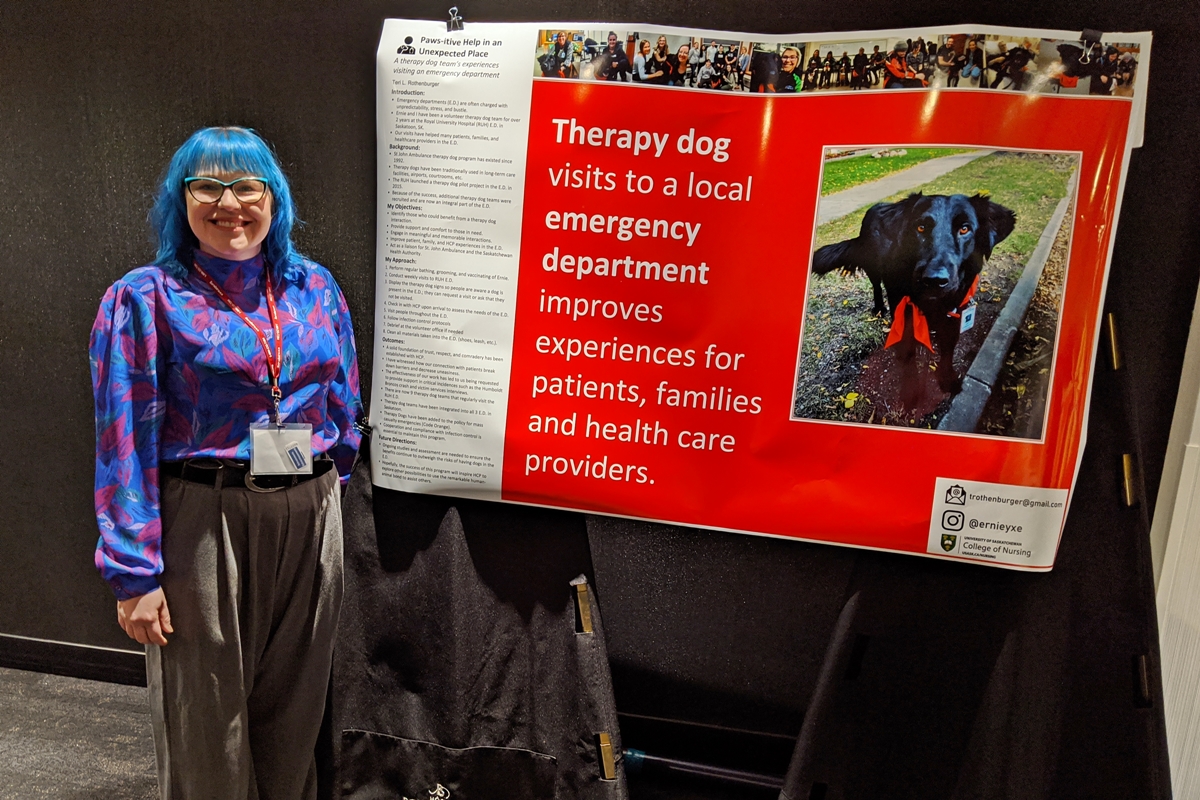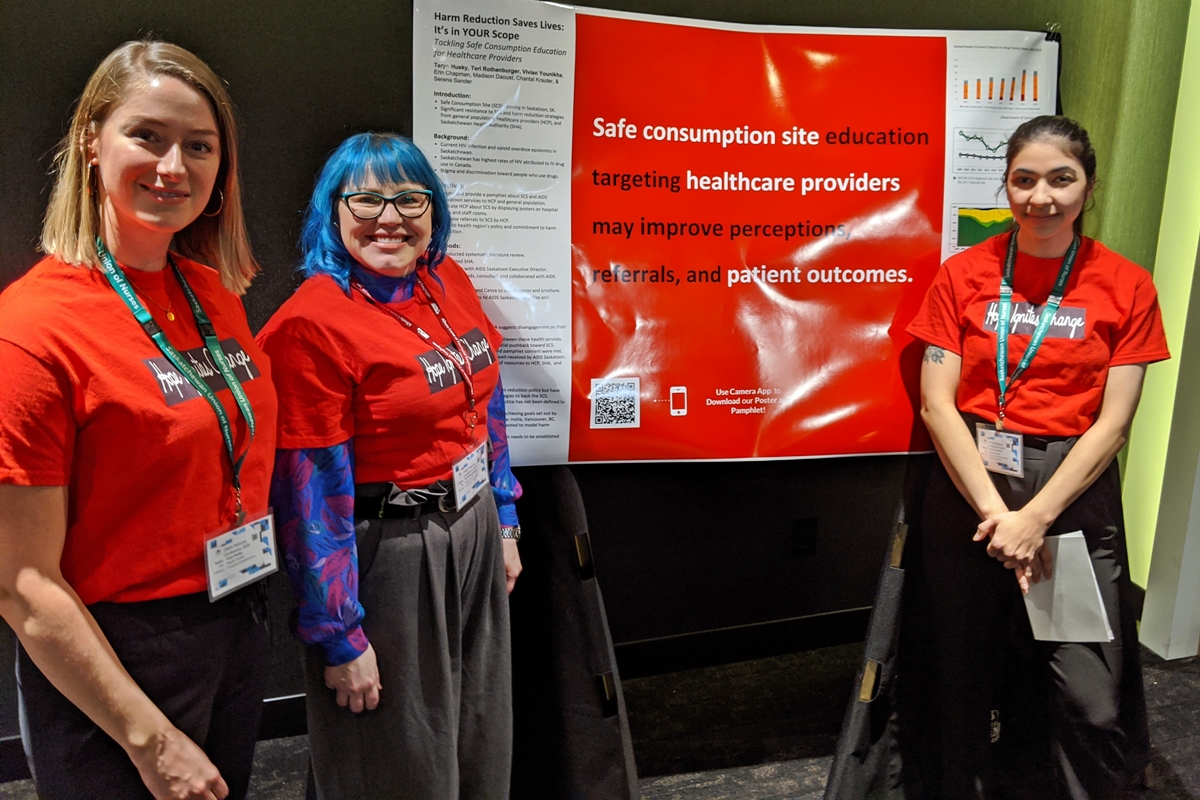
Student Shares Projects on National Stage
Undergraduate student researcher Teri Rothenburger presents three posters at national conference.
Nursing school is busy; the workload is heavy. But in addition to class and clinical, many students are also working on research and community-based projects. One such student is Teri Rothenburger, 4th year nursing student at the University of Saskatchewan Saskatoon campus. Recently she shared not one, but three of her community-based projects, with nursing students and stakeholders from across Canada.
“In January, I attended the Canadian Nursing Student Association National Conference in Montreal and presented three different projects I have been working on,” said Rothenburger. “When I submitted my abstracts, I thought maybe one, not all three projects would be chosen! It was an excellent opportunity to not only share my work, but to see the work of other nursing students across the country. It was so inspiring to see the passion and creativity among us future nurses.”
When asked about the overall experience of sharing her work on a national stage, Rothenburger replied, “I didn’t realize how inspiring and valuable my work would be to other people! Having other students excited about my projects, engaged, and talking to me about how they can incorporate my ideas into their schools and communities, was so rewarding. As a student, when the President of the Canadian Nurses Association wants to know more about your work, nothing tops that!”
Digging for the Community
A pilot initiative to collect and distribute surplus
garden produce to local charities as a means to
address food insecurity and food wastage.

The Digging for the Community project was created to give back to the Saskatoon community by providing fresh, local, nutritious food to those in need, to reduce waste and enhance local food sustainability, and to raise awareness about local food insecurity issues and support through education. Last year as part of the project, a core group of volunteer nursing students harvested, collected, and distributed surplus produce to 14 organizations who were accepting produce donations, including foodbanks, transitional housing units and emergency childcare facilities. This year, Teri and her team plan to build on this successful initiative with earlier collection dates to gather a wider range of produce and partnerships with additional organizations for greater exposure and recruitment of more volunteers.
Paws-itive Help in an Unexpected Place
A therapy dog team’s experiences visiting an emergency department.

People visiting emergency departments often experience unpredictability and anxiety; many places have successfully integrated therapy dogs to minimize the stress in these anxiety-provoking environments. In 2015, a pilot project at the Royal University Hospital (RUH) in Saskatoon, had a therapy dog visit the emergency department to improve patient experiences. Teri and therapy dog Ernie have been a therapy team with St. John Ambulance in the RUH emergency department for over two years.
Her weekly visits focus on providing support to patients, families, and healthcare providers. Over the past two years, she has noticed how quickly patients form connections with Ernie and have witnessed how these connections break down barriers between patients, families, and healthcare providers. Teri and Ernie have provided support during victim services interviews, served as a distraction for children during procedures, and provided comfort for families waiting for updates. Of note, they responded to the Humboldt Broncos bus crash in April 2018 as part of the emergency response team, providing unwavering support for everyone involved.
Teri’s project, Paws-itive Help in an Unexpected Place, documents the success of therapy dogs in emergency rooms. The success of this RUH program has produced many new opportunities, including therapy dog team protocol in mass casualty emergencies, expanded services to two other local emergency departments and research grants to study patient’s pain experiences in the emergency department when visited by a therapy dog.
Harm Reduction Saves Lives: It’s in YOUR Scope
Tackling safe consumption education for healthcare providers.
 (l to r) Taryn Husky, Teri Rothenburger and Vivian Younikha present their work at national nursing conference.
(l to r) Taryn Husky, Teri Rothenburger and Vivian Younikha present their work at national nursing conference.
AIDS Saskatoon has been approved by the Government of Canada to open a safe consumption site in Saskatoon; however, due to the stigmatization of substance use disorders and harm reduction strategies, there has been significant resistance towards the initiative. The Harm Reduction Saves Lives: It’s in YOUR Scope project aims to promote health equity for all, reduce institutionalized discrimination towards individuals who use drugs, and increase awareness of harm reduction resources.
In partnership with AIDS Saskatoon, Teri and fourth year nursing students Taryn Husky, Vivian Younikha, Erin Chapman, Madison Daoust, Chantal Krauter and Serena Sander, created posters and pamphlets to serve as resources to educate health care providers and the public about safe consumption sites. The resource packages were well received by AIDS Saskatoon, but the group continues their pursuit to distribute these materials further. Ultimately, the group hopes by providing additional education for health care providers about safe consumption sites, it may improve perceptions, referrals, and overall, patient outcomes.
In addition to presenting her work at the conference, afterwards Teri was approached by the Canadian Nursing Student Association Community and Public Health Committee to do a webinar on her Digging for the Community initiative.
Congratulations on work very well done Teri! If you would like additional information on the projects listed above, Teri can be contacted here.

